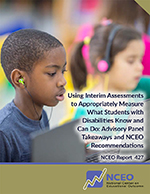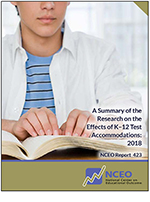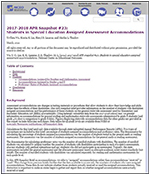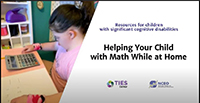Welcome
Greetings from NCEO! In this issue, we highlight several new resources on using interim assessments to measure what students with disabilities know and can do. We also provide information on NCEO presentations at the upcoming National Council on Measurement in Education (NCME) conference and the National Conference on Student Assessment (NCSA). Also highlighted in this issue is a new accommodations literature review report and an annual performance report (APR) snapshot report on students in special education assigned assessment accommodations, as well as four new videos which were recently added to the series of videos for parents of students with significant cognitive disabilities. Information is also provided about a project where NCEO is working as the accessibility lead called the Collaborative for the Alternate Assessment of English Language Proficiency (CAAELP) project.
As always, we welcome your ideas and suggestions for newsletter articles as we work to improve the instruction and assessment of all students, including students with disabilities, English learners, and English learners with disabilities.
Sheryl Lazarus
NCEO Director
Measuring What Students with Disabilities Know and Can do Using Interim Assessments
Many states and districts are interested in using interim assessments. Interim assessments are used for a variety of purposes including measuring growth or progress, for instructional decision making, predicting summative assessment performance, and measuring whether a student meets a grade-level goal. Additionally there is interest in potentially using interim assessments to measure learning losses that may have occurred because of schooling disruptions that occurred as a result of the pandemic.
NCEO recently published three resources which address interim assessments.
NCEO at the National Council on Measurement in Education (NCME) Conference
The National Council on Measurement in Education (NCME) is a professional organization for individuals involved in assessment, evaluation, testing, and other aspects of educational measurement. This year NCME is holding its annual conference virtually from May 18 through June 11. NCEO staff members will present several sessions.
NCEO at the National Conference on Student Assessment (NCSA)
In 2021, the National Conference on Student Assessment (NCSA) celebrates more than 50 years of innovation, spanning five decades of tremendous change in the field of student assessment. NCSA is the premiere forum for assessment practitioners to discuss what is happening in the real world of educational assessment—what is new, what is going on at the state and federal level, what works, and what does not. This year, NCSA will take place virtually on June 21-23, and NCEO staff members will participate in several sessions.
New Accommodations Research Literature Review
NCEO recently published A Summary of the Research on the Effects of K–12 Test Accommodations: 2018 (NCEO Report 423). This report summarizes the research on test accommodations for U.S. elementary and secondary students (K–12) published in 2018. The academic literature described here encompasses empirical studies of performance comparability, investigations into accommodations use, implementation practices, and perceptions of the effectiveness of accommodations.
New APR Snapshot Report on Students in Special Education Assigned Assessment Accommodations
A new Annual Performance Report (APR) Snapshot report titled, Students in Special Education Assigned Assessment Accommodations (APR Snapshot Brief 23), provides information on the number of students with disabilities assigned accommodations and the performance of these students on the general statewide assessment used for Elementary and Secondary Education Act (ESEA) accountability. Using federally submitted data from the 2017-2018 school year, this APR Snapshot presents information on accommodations for general reading and mathematics statewide assessments.
Videos Added to Parent Video Series
NCEO and the TIES Center, both funded by the Office of Special Education Programs, have jointly published four additional videos in a series for parents of K-12 students with significant cognitive disabilities. The videos, available on NCEO’s YouTube Channel, address simple ways for parents of children with significant cognitive disabilities to support their child’s reading and math development at home.
Project on Assessment Accessibility for English Learners with Significant Cognitive Disabilities
NCEO is working with the Collaborative for the Alternate Assessment of English Language Proficiency (CAAELP) project as the accessibility lead. CAAELP is a federally funded 4-year project (2019–2023) awarded to the Iowa Department of Education, and is a collaboration with nine other states (Arkansas, Arizona, Connecticut, Louisiana, Nebraska, New York, Ohio, Oregon, West Virginia) and the National Center for Research on Evaluation, Standards, and Student Testing (CRESST) at the University of California, Los Angeles. Additional partners include Cognia, HumRRO, and CAST. The project will develop an alternate summative English language proficiency assessment for English learners with the most significant cognitive disabilities; it will be based on alternate performance expectations for English language proficiency development.
NCEO’s National Assessment Center is supported through a Cooperative Agreement (#H326G160001) with the Research to Practice Division, Office of Special Education Programs, U.S. Department of Education. The Center is affiliated with the Institute on Community Integration at the College of Education and Human Development, University of Minnesota. The contents of this report were developed under the Cooperative Agreement from the U.S. Department of Education, but do not necessarily represent the policy or opinions of the U.S. Department of Education or Office within it. Readers should not assume endorsement by the federal government.







